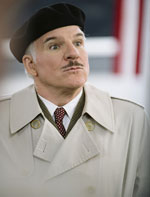 |
Compile a quick list of the greatest comedic characters in film history and accident-prone Inspector Jacques Clouseau would have to be included. Though the role was originally offered to Peter Ustinov, it was the late great Peter Sellers who accepted the part and made it his own in the original Pink Panther back in 1963. Inspired by the classic physical comedy of Charlie Chaplin and Buster Keaton, director Blake Edwards went on to make four sequels before Sellers’ death in 1980 … and then three more after that with far less satisfying results. Does this mean it was Sellers, not the concept, that made the series a hit?
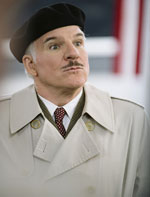
Thirteen years since Edwards’ last theatrical release (the abysmal Son of the Pink Panther, starring Roberto Benigni) and forty-three since the original, The Pink Panther is given a fresh perspective with director Shawn Levy (2003’s remake of Cheaper by the Dozen), screenwriter Len Blum (Stripes), and co-writer/star Steve Martin. Most would say that we need another cinematic remake as much as another sequel to Deuce Bigelow, but The Pink Panther series is a proven franchise that could get more mileage out of a modern overhaul. Unfortunately, as might be surmised from the delays in its release (it was originally slated for last summer), this version might well suggest that the original films’ success was due primarily to Sellers.
Intended to be reverent to the source material, this new Pink Panther is essentially a modernized prequel to the original. Chief Inspector Dreyfus (Kevin Kline, taking the reins from Herbert Lom) is given his most prestigious case to date when Team France’s soccer coach is mysteriously murdered in front of thousands of fans after a win over Team China—his gaudy ring, crafted from the titular diamond, also goes missing amidst the chaos.
Determined to win the Medal of Honor by solving the crime, Dreyfus decides to distract the press and perpetrators from the real sleuthing by publicly assigning France’s most clueless and incompetent officer to the case. Naturally, that man is Jacques Clouseau (Martin), whom Dreyfus partners with Ponton (French actor Jean Reno of The Professional) to watch over his lack of progress. Things develop predictably from there as Clouseau fumbles interrogations with those closest to the soccer coach, succeeding despite his ineptitude.
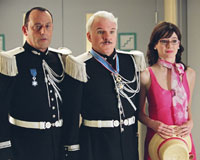
Casting is not the problem here. Martin is an inspired choice and one of the few capable of pulling off the slapstick comedy with intelligence. He’s got the timing, the physicality, the outrageously incomprehensible French accent, and the perfect straight man to play off of with Reno. Kline also does well as the arrogant foil that suffers the most from Clouseau’s clumsiness, and even Emily Mortimer (Dear Frankie) has fun playing the nerdy and equally clumsy secretary Nicole. Among a solid list of character actors and cameos, the only one who truly struggles is Beyoncé Knowles as international pop star Xania. After holding her own in the last Austin Powers movie, she’s a dreadfully bland mannequin here, no better than Britney Spears or Jessica Simpson in their recent movie forays.
Not that she has much to work with when The Pink Panther lacks both strong scripting and directing. Remember when slapstick comedy was golden back in the ’70s and ’80s? Despite a couple scenes involving flatulence and Viagra, this movie mostly refrains from the gross-out humor so prevalent in the last decade. But it also relies on cheap, clichéd gags that are telegraphed from miles away—far beneath the abilities of Martin and Blum, but perhaps what we’ve come to expect from Levy, who was also responsible for the duds Big Fat Liar and Just Married.
When Clouseau borrows Dreyfus’ prized fountain pen, we know he’s going to find a way to make it leak on his boss. And when Clouseau favors an exotic flaming drink in a romantic scene, we know he’s going to spoil the mood by accidentally setting fire to something. But as demonstrated in the original Pink Panther films, the fun in such setups is in devising a cleverly executed cause and effect. This movie provides neither.
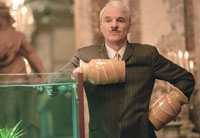
Previous films showed Clouseau as a prideful man who did his best to be nonchalant with his buffoonery. The humor isn’t so much how he gets his hand stuck in a priceless vase or how he removes it, but how he did his best to subtly hide the predicament from anyone else nearby. Here Clouseau gets stuck on full display in front of the owner of the vases and several other people, garnering little more than puzzled expressions as he tries to carry himself with dignity while trying to remove them. Worthy of a smile or a chuckle, but it’s not much better than your average Home Alone knock-off.
The filmmakers seem to have confused stupid with clueless when it comes to Clouseau. The lovable inspector was always dense, but never so much as to walk into a live recording session, between the members of a performing orchestra, to interrogate a suspect while she’s singing a song in a soundproof booth. Later, the idea of Clouseau single-handedly playing the “good cop, bad cop” routine has promise; imagine him arguing with himself while escalating threats and kindness to the confused suspect. In this movie, the gag is too quickly destroyed and just plain dumb; after only one alternation of the routine, Clouseau demonstrates—on himself—his intent to torture, mindlessly hooking up a car battery to his private parts.
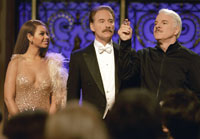
On top of all that, the film subjects us to tired conventions. Nothing grinds a comedy to a halt like the old “You’re off the case” plot development, where we’re all supposed to feel sorry for the protagonist as he mopes around at home while the other officers build up to the climactic finale. Or how about the cutesy romantic subplot between Clouseau and nearly as clumsy Nicole? It was funnier in the older films that Clouseau was still suave enough to attract the Bond babes, not the ones devised to be perfect for him. And of course, with a sexy pop star in the cast, there must be a scene where Beyoncé sings her latest single while characters carry on offstage like a music video—boring, but since she’s singing a programmed pop song with a string section to the delight of the French, she must be sophisticated.
The movie does have its moments, as much reminiscent of Martin’s earliest (and best) work like The Jerk or The Man with Two Brains as the old Pink Panther movies. The actor has a field day playing with slurred speech patterns when a lingual expert tries to teach Clouseau to speak American. Randomness works best, especially in Python-esque scenes involving some unexpected piranha, a telemarketer, and a cyclist who keeps getting injured by Clouseau. But sometimes that also works against the film, making certain gags feel tacked on or strangely edited. At home, an Internet-obsessed Clouseau tries to download a ringtone for his cell phone, only to cause a power outage in the city—no explanation, and no laughter either.
Blame it on the filmmakers, but perhaps it’s time to admit that The Pink Panther series is ready for permanent retirement. Even the familiar opening animation with Clouseau in pursuit of the familiar lanky feline felt lifeless and uninspired. It’s a movie more reminiscent of 1987’s Dragnet, another remake that wasted good comedic talent on a flimsy script littered with tired gags. You can certainly do worse than this version of The Pink Panther, but the humor is as bumbling as its protagonist and as predictable as the programmed remix of Henry Mancini’s classic theme music.
Talk About It
Discussion starters- Contrast Dreyfus’ treatment of his subordinates with Clouseau’s. What does the film say about giving misfits a chance to do good work? Which is more important in getting a job done, talent or heart?
- Despite Dreyfus’ best efforts and attempts to do the right thing, he consistently fails. Meanwhile, Clouseau seems to succeed because of providence or good fortune. Is there a lesson to be learned from this in our daily living (Matt. 6:25-34, for example)? What’s the difference between not worrying and carelessness?
- Should the French be offended by the characterization of Inspector Clouseau and others in The Pink Panther? Is there a difference between this and, for example, the Jamaican accent Jar Jar spoke with in Star Wars: Episode 1? At what point do such characterizations become racist?
The Family Corner
For parents to considerThough this version of The Pink Panther is mostly clean and only rated PG, refraining from bad language and nudity, parents and sensitive viewers should be aware that there is still suggestive language and innuendo. Clouseau is innocently discovered to be involved in compromising positions with Nicole on two occasions, and there is a misunderstanding caused by Clouseau’s confusing accent. There are also jokes involving flatulence, Viagra, and hooking ones private parts up to a car battery (off-screen). The film will admittedly appeal to today’s kids more than the original, but it’s not as family friendly.
Photos © Copyright Columbia Pictures and MGM Pictures
Copyright © 2006 Christianity Today. Click for reprint information.
What Other Critics Are Saying
compiled by Jeffrey Overstreetfrom Film Forum, 02/16/06Steve Martin seems to be striving to recover some of the comic genius he once demonstrated, before his career became mired down in lowbrow comedies like Cheaper by the Dozen. Stepping into Peter Sellers’ shoes and joining forces with director Shawn Levy, Martin is reviving The Pink Panther on the big screen. He’s taking a big risk, bringing back the bumbling Inspector Clouseau. Fans of the original series will be sure to measure his success against that of Sellers’ genius.
Has he succeeded? Well, yes, if you’re checking the box office, where Panther was No. 1 last week.
But has he succeeded in portraying Clouseau? That depends on which critic you ask.
Tom Neven (Plugged In) prefers Sellers’ version of the character, and adds, “Martin isn’t helped by the fact that there are a few genuinely funny moments scripted for him. Throw in completely unnecessary sexual gags and you’re left with a very faded Pink Panther who should have been allowed to rest in peace—or at the very least, left to continue selling fiberglass insulation, not major motion pictures.”
Mainstream critics agree that the Inspector should “rest in peace.”
from Film Forum, 02/23/06Gene Edward Veith (World) says the movie is “sheer, non-stop, slapstick comedy. And Steve Martin, who co-wrote the script, is a master of physical comedy.” He goes on to defend the slapstick, and “wordplay, silly voices, and ethnic humor” from the criticism of other reviewers.
But Christie Hudon (Relevant) says, “Slapstick movies have their place, if the plot is unconventional … but a feature length film that is nothing more than a slathering of clichés fails to excite.”

